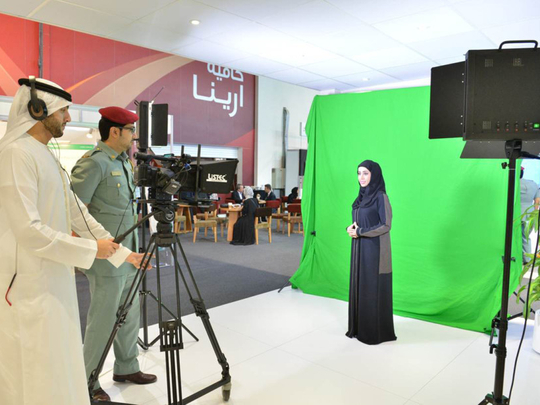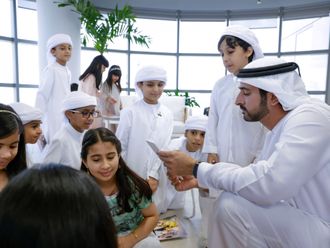
Dubai: When the General Directorate of Residency and Foreigners Affairs’ (GDRFA) Media Observation Department was launched in 2012, the team had a single member and was based in a tiny room at the GDRFA headquarters.
Today, the Media Observation Department is functioning in a full-fledged studio featuring a green-screen, a teleprompter, state-of-the-art computers, HD cameras and its own archiving server.
The team archives most of the GDRFA’s events, functions and officials’s statements, uploading them to their YouTube and Instagram channels for the public to see. The four-member team also has representatives camping in broadcasting stations across the UAE, who liaise with residents about GDRFA’s services, and reach a solution to their concerns.
“The GDRFA saw it necessary to have a team dedicated to recording its press conferences, events and interviews with officials and archiving them,” Ali Abdulrazzaq Majjan, department spokesman, said, “when the Media Observation Department (MOD) first started out in late 2012, I was its sole member. It was very hectic. I was responsible for the whole process of videography, editing and archiving.”
Majjan said the team surveys radio stations, such as Al Noor Dubai, Ajman radio and RAK radio. Queries and concerns by both Arabic and English-speaking residents are referred to the relevant department at the GDRFA.
“We keep tabs on various broadcasting stations across the UAE. If any resident calls a radio station with a complaint or an inquiry, our representative there puts us in touch with the concerned resident and we try our best to find a remedy to the problem,” Majjan said, “common complaints include a visa-issuing process taking too long and queries about specific procedures. We send the relevant department a sound-bite of the query and information about the caller. The department, in its turn, answers to their query.”
Most of the time, according to Majjan, the team tries to answer a resident’s concern immediately.
“In many instances, we’ve contacted the broadcasting channel while a resident is still on the air,” he said, “the presenter then asks the caller to respond to an incoming call on the other line, where we personally deal with the concern.”
Majjan said the MOD now consists of four members responsible for an array of projects. The department members also include: Hessa Salem Al Shamsi; Majjan’s brother, Abdulla Abdulrazzaq; and Nasser Butti Al Mutawa.
“We also highlight the latest GDRFA technologies, uploading instructional videos of the apps, smart gates and e-gates on our online channels,” he said, “this helps facilitate the usage of the GDRFA’s technologies and avoid any misconceptions about them.”
While MOD’s videos are all in Arabic, the team has placed English subtitles in some and is considering inserting them for most future videos.
The team is also responsible for archiving important GDRFA functions, such as the recent Future of Borders symposium and Gitex.
“During last year’s GITEX, we shot, edited and uploaded over 50 videos over a period of five days,” Majjan said, “We recorded interviews with officials, the commencement speeches and highlighted the technologies displayed in a number of stalls. If the GDRFA had approached a third-party media department, the project would’ve cost over Dh10,000, depending on the use of effects. By having an in-house media team, the department is saving both money and time, without risking quality or efficacy.”
Hessa Al Shamsi, who also works at MOD, said one of the daily projects of the team, include shooting and uploading ‘Sabah El Kheir Ya Wattan’ (Good Morning Nation), where employees explain what they do at the GDRFA.
“It’s one of our favourite projects,” she said, “we highlight an employee every day as they elaborate on their roles and duties at the GDRFA, ending the video with a positive note. This is especially great for fellow employees as it acts as a morale booster and informs them what their peers do.”
Al Shamsi said not many were keen on being recorded when the project first came about.
“People were initially hesitant for whatever reason,” she said, “however, with the program’s increasing popularity, we are facing no shortages of employees who’d like to be featured. Even those who initially refused are now asking to be filmed.”
Al Shamsi said the programme has its own soundtrack theme and a template that makes it instantly recognizable.
“We are learning day by day, step by step,” she said, “we started with rudimentary technologies and skills and have now come a long way. We set up all of the studio’s equipment ourselves and are still looking at ways we can develop and widen our audience reach.”












